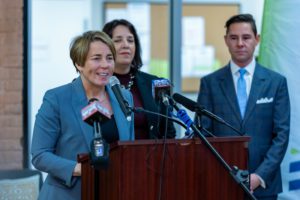Who is a member?
Our members are the local governments of Massachusetts and their elected and appointed leadership.

Gov. Maura Healey, Lt. Gov. Kim Driscoll and Secretary of Economic Development Yvonne Hao tour Ludlow Mills in Ludlow on Jan. 19. (Photo courtesy Joshua Qualls/Governor’s Press Office)
The Healey-Driscoll administration today filed legislation seeking $987 million in bond authorization to preempt interruptions to core state capital programs supporting housing and economic development and to improve the state’s competitive position for federal grants.
The administration also filed a two-year, $400 million Chapter 90 bond bill to fund improvements to municipally owned roads and bridges across the Commonwealth. The administration said it is seeking a two-year authorization to enable cities and towns sufficient time to put the funds to work given the planning and coordination required to get critical projects completed.
The Immediate Needs Bond Bill is aimed at providing funds for critical infrastructure programs that have exhausted existing resources, such as MassWorks and the Middle Mile Broadband program.
Gov. Maura Healey and Lt. Gov. Kim Driscoll announced the filing at Greylock Works in North Adams and at Ludlow Mills in Ludlow, two projects that previously received MassWorks funding and represent the impact the program has on local communities.
The bill also proposes authorization to ensure the continuity of several other ongoing housing production and preservation programs in the near-term. It includes key grant programs that support cities and towns for libraries, seaport development, housing, tourism, planning, and targeted funds for rural and small towns.
Finally, the bill includes state matching funds to position the Commonwealth to take advantage of opportunities to compete for once-in-a-generation federal grant dollars in areas including climate change, advanced manufacturing, broadband access, water and sewer infrastructure, and technology.
“This bill ensures that critical housing, infrastructure and community development programs have the funding needed to continue serving the people of Massachusetts,” Gov. Healey said. “We look forward to working with our colleagues in the Legislature and other stakeholders as we develop our broader long-term strategy to increase housing production and preservation, and expand economic opportunity for all residents, which will culminate in a more comprehensive bond bill later this session.”
“At a time when increasing the housing supply in the Commonwealth is a top priority, it is imperative that core capital programs that support these objectives are sufficiently funded and continue to operate,” Lt. Gov. Driscoll said, adding that the bond package will position Massachusetts “to take advantage of federal grant opportunities that will multiply the impact of our resources.”
The bill proposes a total of $110 million in authorization to continue to support housing creation and preservation, including affordable rental housing production and rehabilitation, public housing, climate resilient housing, and transit-oriented development. This includes additional authorization for programs that are out of authorization, or nearly so, but remain in high demand and are core to efforts to expand and preserve the state’s housing supply. These programs include the Housing Stabilization Fund, Housing Innovations Fund, Smart Growth Housing Trust, and Facilities Consolidation Fund.
The bill includes $48 million for the repair and modernization of public housing units that support approximately 80,000 residents across more than 230 municipalities.
The proposed authorization would provide a total of $482 million to finance economic development programs that directly benefit Massachusetts communities, with $400 million proposed for the MassWorks Infrastructure Program.
MassWorks is the largest and most flexible source of capital funds to municipalities for public infrastructure projects that support and accelerate housing production, spur community development, and create jobs throughout the Commonwealth. As one of 12 programs administered through the Community One Stop for Growth, MassWorks has funded more than 500 projects since its creation in 2011. The administration said its proposed authorization would enable hundreds of additional local projects to move forward.
The bond package proposes additional authorization for other Community One Stop for Growth programs as well, including $34 million for the Underutilized Properties Program, which improves, rehabilitates and redevelops blighted, abandoned, vacant or underutilized properties, $5 million for the Rural and Small Town Development Fund, which supports capital and community planning in low-population areas, and $1 million for Community Planning Grants.
The legislation also proposes additional resources for a number of other high-demand community economic development programs that will need additional authorization over the next two years:
• $104 million for the Clean Water Trust to finance communities’ efforts to improve water infrastructure and improve local water quality
• $52 million for programs supporting the Commonwealth’s innovation economy, including the advanced manufacturing sector, purpose-driven research, technology development, and in emerging technologies such as artificial intelligence and machine learning, robotics, quantum information science, cybersecurity, communications, and digital health
• $9.3 million for broadband infrastructure, particularly in central and western Massachusetts communities
The administration said its bill proposes funding that would put Massachusetts in a position to compete for new, historic levels of federal grant opportunities. Proof of available matching funds are generally required as a condition of applying for a federal award, and showing the availability of dedicated funds for this purpose dramatically strengthens the state’s application to any such federal program.
The bill proposes $200 million as a state match for competitive federal grant programs, such as the CHIPS and Science Act. Similarly, the bill includes $40 million to enable the state to apply for federal broadband and digital equity initiatives. It also includes $30 million to allow the Commonwealth to compete for community broadband dollars funded at the federal level through the Infrastructure Investment and Jobs Act (also known as the Bipartisan Infrastructure Law).
• View the governor’s filing letter for the bond bill and Chapter 90 bill